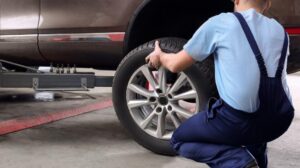## Can You Use Winter Tires All Year?
Winter’s chill is retreating, yet many drivers are left wondering: should their trusty winter tires stay on the car? While it might seem tempting to sidestep the hassle of switching tires, using winter tires all year isn’t as straightforward as it appears. Let’s dig into why your winter tires might actually need a seasonal retirement.
### What Types of Tires Are There?
Before deciding if you should keep those winter tires on, it’s important to know the differences between tire types. Here’s a quick breakdown.
#### Snow Tires
Snow tires are engineered to brave snow and ice, with deeper treads and special rubber compounds that stay flexible in freezing temperatures. They’re designed for conditions consistently below 45 degrees Fahrenheit. These tires are your best friend during harsh winters but out of their element once things warm up.
#### Summer Tires
Crafted for warmer climates, summer tires provide optimal grip and handling in temperatures above 70 degrees Fahrenheit. Their rubber formulation offers better performance on hot pavement, making them unsuitable replacements for the icy capabilities of snow tires.
#### All-Season Tires
All-season tires strike a balance between performance in summer heat and winter chill. They work well in regions experiencing mild winters, where snow is rare. For many, they provide sufficient year-round performance without the need for swapping.
### What Happens If You Use Winter Tires All Year?
Keeping those winter wonders on might sound convenient, but it can lead to several downsides.
#### Top Reasons to Swap Winter Tires When the Weather Warms Up
– **Wear and Tear**: Summer heat softens winter tire rubber, causing uneven wear and compromising tire shape and pressure.
– **Handling**: The very features that grip snow can cause issues on dry, warm roads, affecting both handling and safety.
– **Mileage**: Extended use in summer leads to quicker wear, reducing their lifespan and efficiency in winter.
– **Safety**: Poor tire performance in summer increases the risk of accidents due to compromised grip and stability.
– **Noise**: Without snow and ice as a buffer, winter tires can be noisy, especially studded ones.
– **State Laws**: Some states prohibit studded tires beyond certain dates due to road damage concerns.
– **Cost**: Faster degradation in warm weather leads to more frequent replacement, offsetting any perceived savings.
### Have Questions About Your Tires? We Can Help!
If you’re confused about the best tires for your vehicle, visit a Meineke near you. Our experts will ensure your tires are traction-ready, boosting fuel efficiency and ride comfort. Find a location at [Meineke Locations](https://www.meineke.com/locations/).
#### Conclusion
Winter tires play a crucial role during their designated season, but when the sun takes charge, it’s time for a tire change. By understanding the unique needs of different tires, you can ensure safety, improve efficiency, and extend the lifespan of your tires. For more insights and tips on tire care, visit [Manx Design](https://manx.design).
**Tags**: winter tires, tire safety, vehicle maintenance, automotive care, tire types
**Meta Description**: Discover why winter tires aren’t suited for year-round use and learn about different tire types to keep your driving safe and efficient.
**Excerpt**: Considering leaving winter tires on all year? Learn why this isn’t recommended and explore your tire options for optimal performance.






